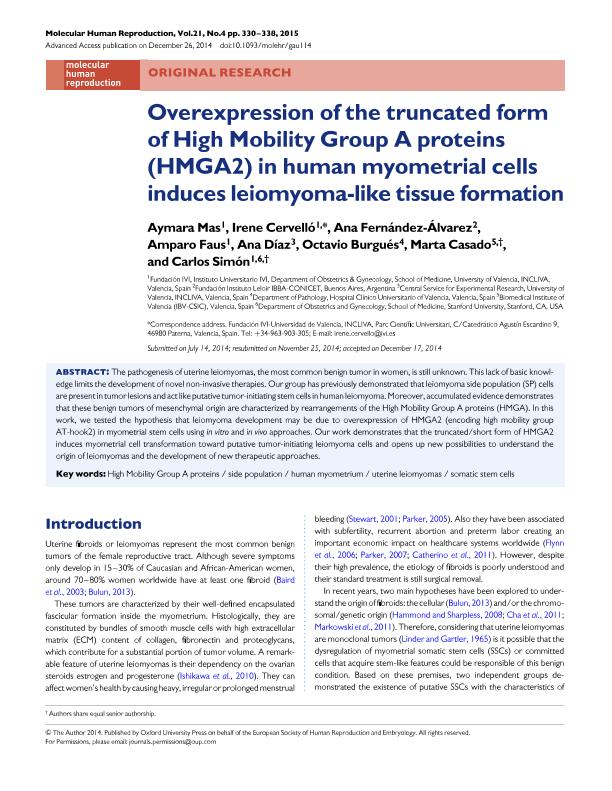Artículo
Overexpression of the truncated form of high mobility group a proteins (HMGA2) in human myometrial cells induces leiomyoma-like tissue formation
Mas, Aymara; Cervelló, Irene; Fernández Alvarez, Ana Julia ; Faus, Amparo; Díaz, Ana; Burgués, Octavio; Casado, Marta; Simón, Carlos
; Faus, Amparo; Díaz, Ana; Burgués, Octavio; Casado, Marta; Simón, Carlos
 ; Faus, Amparo; Díaz, Ana; Burgués, Octavio; Casado, Marta; Simón, Carlos
; Faus, Amparo; Díaz, Ana; Burgués, Octavio; Casado, Marta; Simón, Carlos
Fecha de publicación:
12/2014
Editorial:
Oxford University Press
Revista:
Molecular Human Reproduction
ISSN:
1360-9947
Idioma:
Inglés
Tipo de recurso:
Artículo publicado
Clasificación temática:
Resumen
The pathogenesis of uterine leiomyomas, the most common benign tumor in women, is still unknown. This lack of basic knowledge limits the development of novel non-invasive therapies. Our group has previously demonstrated that leiomyoma side population (SP) cells are present in tumor lesions and act like putative tumor-initiating stemcells in human leiomyoma. Moreover, accumulated evidence demonstrates that these benign tumors of mesenchymal origin are characterized by rearrangements of the High Mobility Group A proteins (HMGA). In this work, we tested the hypothesis that leiomyoma development may be due to overexpression of HMGA2 (encoding high mobility group AT-hook2) in myometrial stem cells using in vitro and in vivo approaches. Our work demonstrates that the truncated/short form of HMGA2 induces myometrial cell transformation toward putative tumor-initiating leiomyoma cells and opens up new possibilities to understand the origin of leiomyomas and the development of new therapeutic approaches.
Archivos asociados
Licencia
Identificadores
Colecciones
Articulos(IIBBA)
Articulos de INST.DE INVEST.BIOQUIMICAS DE BS.AS(I)
Articulos de INST.DE INVEST.BIOQUIMICAS DE BS.AS(I)
Citación
Mas, Aymara; Cervelló, Irene; Fernández Alvarez, Ana Julia; Faus, Amparo; Díaz, Ana; et al.; Overexpression of the truncated form of high mobility group a proteins (HMGA2) in human myometrial cells induces leiomyoma-like tissue formation; Oxford University Press; Molecular Human Reproduction; 21; 4; 12-2014; 330-338
Compartir
Altmétricas



